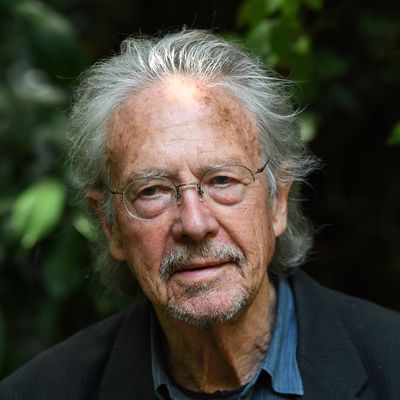
On Thursday, the Swedish Academy awarded the Nobel Prize in Literature to Polish writer Olga Tokarczuk and Austrian playwright and novelist Peter Handke. The rare double award came after the academy punted last year, in the wake of allegations of sexual misconduct and embezzlement, for the first time since World War II.
Tokarczuk, officially the winner of the 2018 prize, was a predictable and reasonably safe choice (with solid odds in the U.K. betting markets). Handke, taking the 2019 award for an influential work that  has explored the periphery and the specificity of human experience, was another story  his name is associated with hard-right nationalism as much as literary posterity. After last years Nobel scandal, which led to the imprisonment of Jean-Claude Arnault, the husband of a member of the Swedish Academy, and the departure of numerous Nobel Committee members, the recognition of Handkes work brought swift backlash online and in the press.
HandkeÔÇÖs polarizing reputation stems primarily from his relationship with the late Serbian president Slobodan Milo┼íevi─ç, a nationalist war criminal who was imprisoned for ordering ethnic cleansing and genocidal killings during the Bosnian War. Handke gave an infamous eulogy at the presidentÔÇÖs funeral, following his death in a Hague prison cell, and once called the politician ÔÇ£a rather tragic man. Not a hero, but a tragic human being. I am a writer and not a judge.ÔÇØ
The NobelÔÇÖs extended citation for Handke, acknowledges the controversy, but quickly distances both him and the committee from it: ÔÇ£Although he has, at times, caused controversy he cannot be considered an engaged writer in the sense of Sartre, and gives us no political programs.ÔÇØ But the idea that the academy is apolitical would be news to anyone whoÔÇÖs ever hoped to be on its list. ItÔÇÖs long been believed that Philip Roth missed out on the prize (which is only awarded to living writers) as a result of his perceived regressivity on gender and objectification of women. The real news is that its choice this year leaned too far to the right.
According to the Guardian, the academy had hoped to depart this year from ÔÇ£male-orientedÔÇØ and ÔÇ£EurocentricÔÇØ winners (15 out of the 115 laureates are women). In recent years itÔÇÖs tacked in novel directions, awarding Svetlana Alexievich in 2017 ÔÇö a journalist and oral historian but not a fiction writer or poet ÔÇö and, of course, the marginally literary Bob Dylan in 2016. So Handke is in many ways a return to form.
Compounding outrage with irony is the fact that in 2014, Handke himself told an Austrian newspaper, ÔÇ£The Nobel prize should finally be abolished,ÔÇØ calling the prize a ÔÇ£false canonizationÔÇØ of literature. (Slovenian Marxist Slavoj ┼¢i┼¥ek told the Guardian that their choice of Handke ÔÇ£proves that he was right.ÔÇØ) Interviewed on-camera this morning by Agence France-Presse, Handke said, ÔÇ£IÔÇÖm not a winner. My nature is not the nature of a winner.ÔÇØ When a reporter asked what the award meant to him, he replied, ÔÇ£FreedomÔǪ as if I were ÔÇö which is not the true ÔÇö as if I were innocent.ÔÇØ
Though a Swedish Academy spokeswoman has declined to comment on the committeeÔÇÖs decision-making in response to several news outlets, PEN America issued a statement expressing ÔÇ£deep regretÔÇØ over their decision: ÔÇ£We are dumbfounded by the selection of a writer who has used his public voice to undercut historical truth and offer public succor to perpetrators of genocide.ÔÇØ
Perhaps next year the academy can award a nationalist who might be a little more grateful ÔÇö and give the Peace Prize to President Trump in return for securing ÔÇ£victory for the world.ÔÇØ


